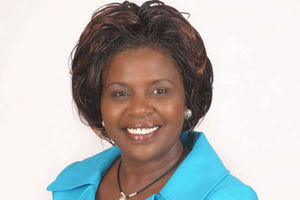Unrest erupts as Comoros opposition rejects presidential vote

Opposition supporters gesture during a demonstration in Moroni on January 17, 2024 following the announcement of the presidential elections. Azali Assoumani won re-election on January 16, 2024 in the first round of an already disputed presidential vote in the Comoros, an Indian Ocean island chain, dismissing a low turnout and allegations of fraud
What you need to know:
- Some demonstrators ransacked a former minister's house and set it on fire, as others tried to block roads in the capital.
Debris, furniture and burning tyres were scattered in several streets of Moroni and the Indian Ocean archipelago's largest street market lay deserted in the morning after the disputed poll results were announced.

A general view of debris in the road during an opposition demonstration in Moroni on January 17, 2024, following the announcement of the presidential elections.
Moroni, Comoros
Security forces in the Comoros clashed Wednesday with protesters angered by the re-election of President Azali Assoumani, as opposition leaders denounced this week's vote as fraudulent.
Some demonstrators ransacked a former minister's house and set it on fire, as others tried to block roads in the capital. Police responded with tear gas and arrests, AFP reporters saw.
Election officials said on Tuesday that Assoumani had won 62.97 percent of the vote in Sunday's ballot, but the five opposition challengers cried foul, alleging ballot-stuffing and inconsistent results.
"Incontestably these ballots of Sunday January 14, 2024 are invalid. We denounce them and demand their pure and simple annulment," the candidates said, in a joint statement.
Debris, furniture and burning tyres were scattered in several streets of Moroni and the Indian Ocean archipelago's largest street market lay deserted in the morning after the disputed poll results were announced.
Tear gas shots echoed through the streets well into the afternoon and black plumes of smoke billowed over the city as police and the army tried to clear roads blockaded by demonstrators.

People stand next to debris in the road following an opposition demonstration in Moroni on January 17, 2024, following the announcement of the presidential elections.
Government spokesman Houmed Msaidie, speaking to AFP, accused the opposition of organising the protests.
"There have been arrests, but I can't give you the figure for the moment. It's totally normal when there are people out there who want to disturb public order," Msaidie said.
There have been no reports of deadly violence, but the Comoros -- a three-island chain with a population of about 870,000 -- is politically volatile and has seen 20 coups or attempted coups since independence in 1975.
Official results released Tuesday showed Assoumani, a former coup leader turned civilian president, won re-election in the first round.
But official turnout was unexpectedly low at 16 percent and large discrepancies in the number of votes reportedly cast for the presidential and regional governor races have raised doubts about its regularity.
The opposition candidates said they were "horrified" to note that the official results implied improbably that more than two-thirds of people voted to elect island governors but failed to cast a presidential ballot in a parallel vote in the same polling stations.
"It's impossible," they said, adding this called into question the veracity of the official results.
"There is nothing to say: a flagrant fraud has been committed."
Police, gendarmes and armed soldiers were deployed in large numbers as the day began. They used tear gas to drive civilians from the streets and back into their homes.
In the working-class Coulee district in the north of the city, groups of youths threw stones at the troops, but many residents were making ready to flee, anticipating further tension.
"Everyone is gone. I'm going too. I was tear-gassed," said Amina, a stallholder in the normally bustling Volo-Volo market, now just rows of empty wooden stands.
A former army chief-of-staff, Colonel Assoumani initially came to power in a coup in 1999, before handing over to civilians in 2006.
He returned to politics and won re-election in 2016 in a vote marred by violence and allegations of irregularities.
He has since been accused of creeping authoritarianism. His arch-rival ex-president Ahmed Abdallah Sambi was given a life sentence for high treason for allegedly selling passports.
During this year's campaign, Assoumani hailed his government's construction of roads and hospitals.
But in a country where 45 percent of the population live below the poverty line, plagued by electricity cuts and water shortages, he has faced popular criticism.





